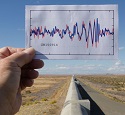Ripples in spacetime: Science’s 2016 Breakthrough of the Year
will.ferguson
Washington State University researchers and adjunct faculty were part of the international research team that discovered gravitational waves in 2016. Science Magazine recently named the discovery its 2016 Breakthrough of the Year. The achievement fulfilled a prediction made 100 years ago by Albert Einstein and capped a 40-year quest to spot the ripples in spacetime.



